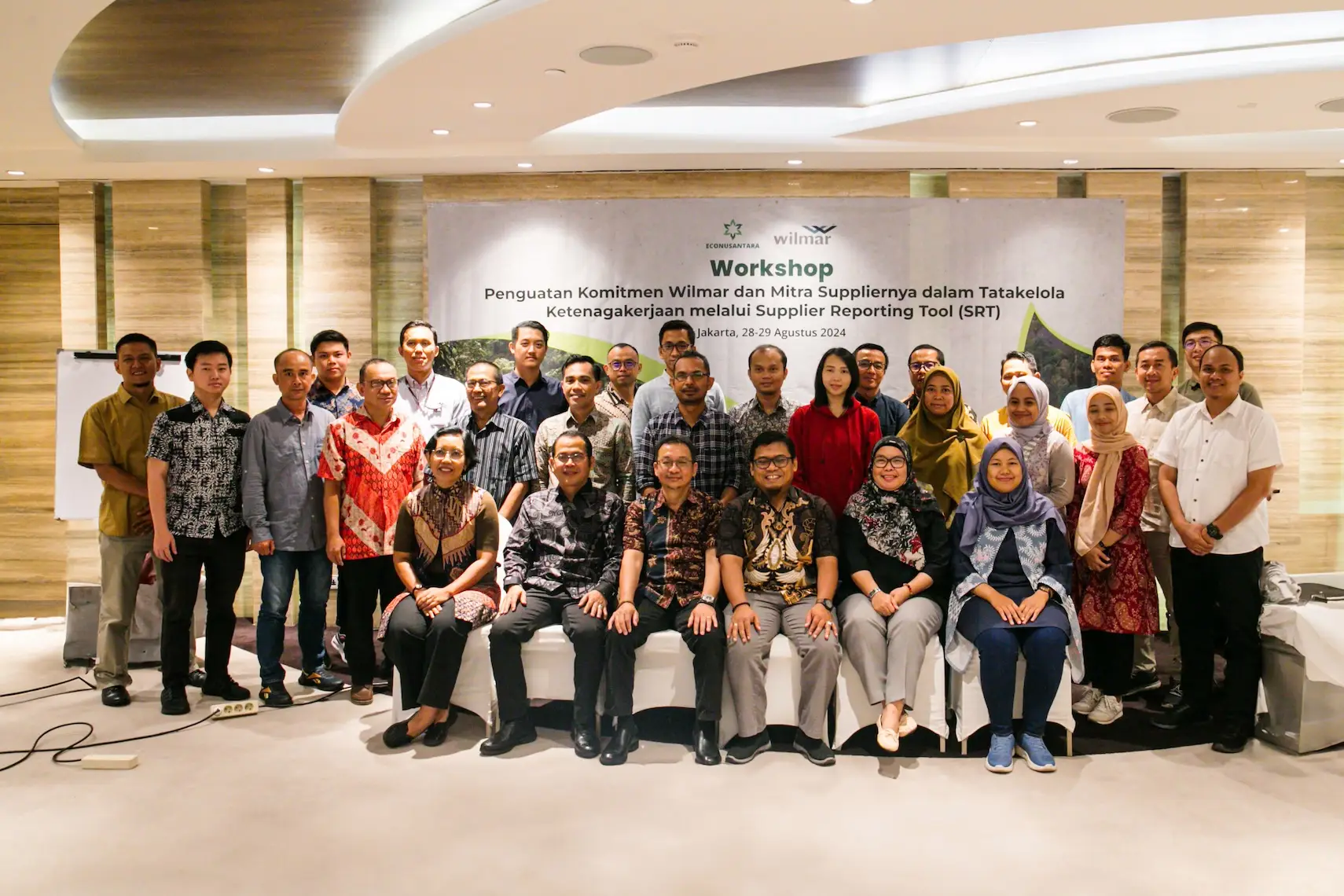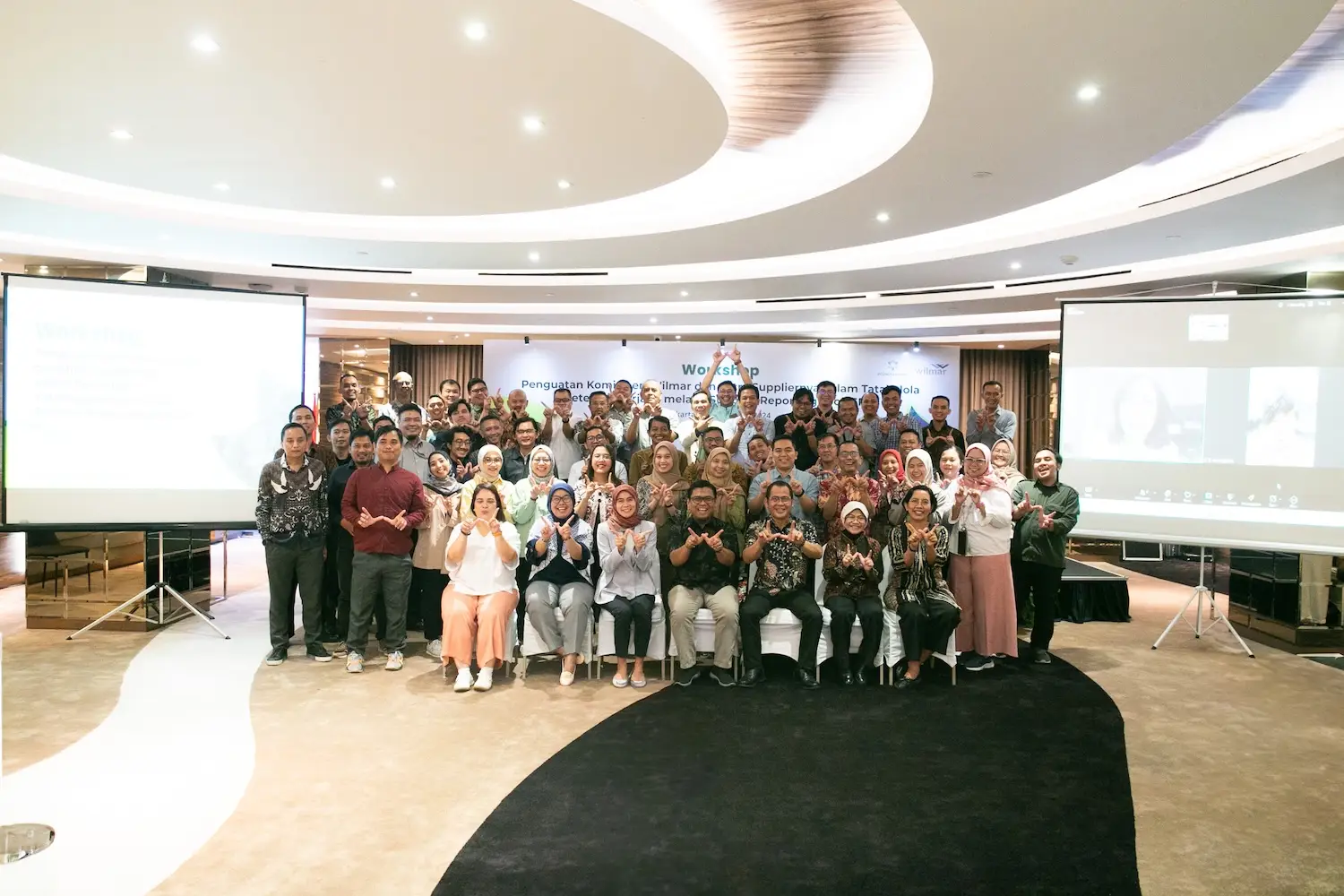Since first issuing its No Deforestation, No Peat, No Exploitation (NDPE) policy in 2013, Wilmar International has faced a number of challenges in its implementation. The most pronounced challenge is when communicating this policy to suppliers. This is because the scope of NDPE is not only limited to Wilmar’s internal operations, but also to the companies in its supply chain.
In response to this challenge, Wilmar continues to strive to encourage suppliers to be actively involved in the strict implementation of the NDPE policy, so that the products produced can meet the demands of the global market.

To ensure NDPE policy is implemented by suppliers, Wilmar launched the Supplier Reporting Tool (SRT) program in 2017. “SRT is a self-assessment platform for NDPE implementation by suppliers,” said Surya Purnama, Supplier Compliance Lead, Wilmar International in a workshop entitled ‘Strengthening the Commitment of Wilmar and its Supplier Partners in Labor Governance through the Supplier Reporting Tool SRT’ last August in Jakarta.
According to Surya, NDPE policy and implementation has now become one of the prerequisites requested by multinational companies. “Therefore, the implementation of NDPE at the supplier level is very important to ensure that the products produced are sustainable products,” Surya explained.
Wilmar, Surya said, has always strengthened the NDPE policy. Since it was first issued in December 2013, the NDPE policy has been updated in 2019. “Strengthening this policy is part of Wilmar’s commitment, to create a more effective system in ensuring sustainability throughout its supply chain,” he added.
Sustainable Commitment?
Pujuh Kurniawan, Indonesia Sustainability Lead, Group Sustainability at Wilmar International, explains why this multinational company is so strict in implementing its sustainability commitments. According to him, as a large company, it cannot mess around with the commitments that have been implemented.
“There is a commitment to buyers, suppliers, and it is even stated in the contract that the NDPE policy is a necessity,” said Pujuh. According to him, this is aimed at protecting suppliers and the company itself, as well as showing the real implementation of these commitments.
Wilmar hopes to work together for improvement. He explained that while some suppliers may not know or understand the NDPE policy, the number of those who do not want to know is very small. More are unaware or do not fully understand, and Wilmar cannot do it alone. Pujuh acknowledged challenges such as overlapping regulations, but appreciated the significant improvements made by the government in the last five years.
Pujuh emphasized the importance of effective communication and collaboration with various parties, including non-governmental organizations at the local level. The point is to build synergy and tackle problems together. “Instead of just making reports or agreements that are not followed by concrete actions, we prefer to work directly on the ground,” he said.
Wilmar, in this case, has started working with various stakeholders to ensure that every step in the sustainability initiative is actually implemented and can be measured. He mentioned that Wilmar does not only focus on sustainability reports, but is also committed to training and capacity building for farmers. For example, Wilmar has developed an app to assist farmers in reporting their activities and increasing their capacity in terms of sustainability.
“We are not only talking about price, but also additional benefits such as training and geolocation which we have been doing since 2014,” Pujuh said.
Inclusive Collaboration
Pujuh highlighted the importance of multi-stakeholder collaboration, including governments and associations, to create a more inclusive and effective system for implementing sustainability policies. He also recognized that it is not only Wilmar that is expected to implement high standards in sustainability, but many other companies must also commit.
“However, we face the reality that some other companies may not fully follow the same rules,” Pujuh said. According to him, although each company has different goals and strategies, it is important for Wilmar to share the benefits and responsibilities in business to be more sustainable and avoid risks.

In addition, Pujuh also explained that Wilmar’s management chose not to control the entire supply chain, but rather to build a benefit-sharing system. This business model, he said, makes it easier for the company to handle responsibilities and reduce risks. Through blockchain and a multi-stakeholder approach, the company wants to ensure that sustainability is not a responsibility to be shouldered alone.
Pujuh emphasized the significant change in global demands related to climate change. He explained that in the past, awareness of climate change issues may not have been a priority for many. But now, the impacts of climate change have become very real and can no longer be ignored, such as landslides and floods.
“We have to realize that beyond business issues, there is a moral responsibility that we need to communicate and take seriously,” Pujuh said.
To achieve sustainable results, Pujuh emphasizes the need for role models that can be followed. Currently, his party is starting from a small scale with the hope that it can grow and become a role model that can be adopted by the government, farmers, and other companies. Sustainability does not only focus on making reports or claims, but on building a system that actually works and provides benefits to all parties involved.
Pujuh also admitted that three years ago, Wilmar rejected 1.5 million tons of palm oil that did not apply NDPE principles. But unfortunately, the palm oil supply was accepted by other palm oil processing companies. This condition, he added, requires an understanding between palm oil companies about the sustainability system. It is not enough for Wilmar alone.
“The initial suspension was painful, but that’s the risk. This is part of the reputation that we must carry out, the commitment that we must emphasize so that we are no longer accused by NGO friends (of being involved in deforestation). If you say perfect, not yet, but in process, on going,” said Pujuh.
In the context of business associations, Pujuh highlighted the importance of practical benefits and mutually beneficial collaboration. Business associations must be able to provide tangible benefits to their members. For example, farmers who join ISPO not only get training but also financial support and the necessary heavy equipment.
Pujuh also emphasized the importance of landscape approach that involves multiple stakeholders. He also emphasized that sustainability is about achieving balance for all parties involved.
“We are building our image, reputation and credibility through the implementation of sustainability that is truly practical and backed by tangible support. We want to be a role model in facing this challenge, by involving not only companies, but also farmers, to work together to create effective solutions,” he said.
In November last year, Coordinating Minister for Economic Affairs Airlangga Hartarto said that the palm oil industry, which is an integral part of the global economy and plays an important role in the national economy, has successfully contributed to the creation of productive jobs and employment opportunities, food security, energy security, and the provision of consumer goods. This has also had an impact on reducing poverty levels among rural farmers, including smallholders.
Furthermore, with an estimated world population of 9.8 billion by 2050, the world will need an additional 200 million tons of vegetable oil production by then.
“Palm oil is a sustainable and efficient way to meet the growing demand for vegetable oils. Palm oil also supports the provision of more environmentally friendly transportation fuels, such as sustainable aviation fuel. Indonesia has developed SAF known as BioAvtur 2.4% or J2.4,” Airlangga said.
To increase palm oil productivity, Indonesia has replanted 200,000 hectares since 2007 and 180,000 hectares are being replanted this year with a budget of USD 386 million.
At the global level, the European Union’s initiative through the European Union Deforestation Regulation (EUDR) policy to limit deforestation caused by forestry and agricultural activities worldwide, will have a direct impact on Indonesia’s key commodities of palm oil, coffee, cocoa, rubber, soy, cattle and timber.
“Despite our concerns, the government is ready to collaborate with the EU in building a framework that promotes sustainable agriculture, including vegetable oil production, in an inclusive, holistic, fair and non-discriminatory manner. It is crucial for the EU to recognize and be fully aware that the national sustainability standards of producing countries can meet the requirements needed to access the EU market,” Airlangga stressed.
Source: https://tangkasi.id/holistic-strengthening-of-wilmars-ndpe-policy-implementation/